

ABS Plastic is one of the most popular material choices in injection molding. It is an amorphous thermoplastic widely used in manufacturing through injection molding techniques.
This article provides an in-depth analysis of the role of ABS in injection molding. This article encompasses What is ABS plastic? Its properties, its applications and when you should consider ABS plastic for your projects.
ABS, abbreviated for Acrylonitrile Butadiene Styrene, is a type of thermoplastic polymer.
ABS plastic is a polymer made up of three monomers: acrylonitrile, butadiene, and styrene.
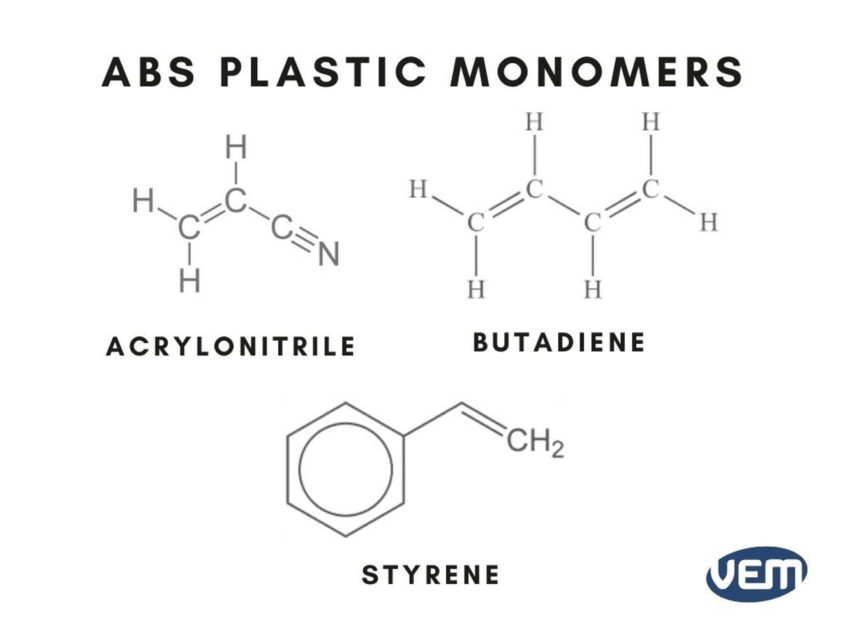
Each of these three monomers has distinct properties and they combine their specific properties into the polymer to create a robust polymer that can resist impacts. Let’s understand more about each of the 3 monomers that combine to form the ABS plastic:
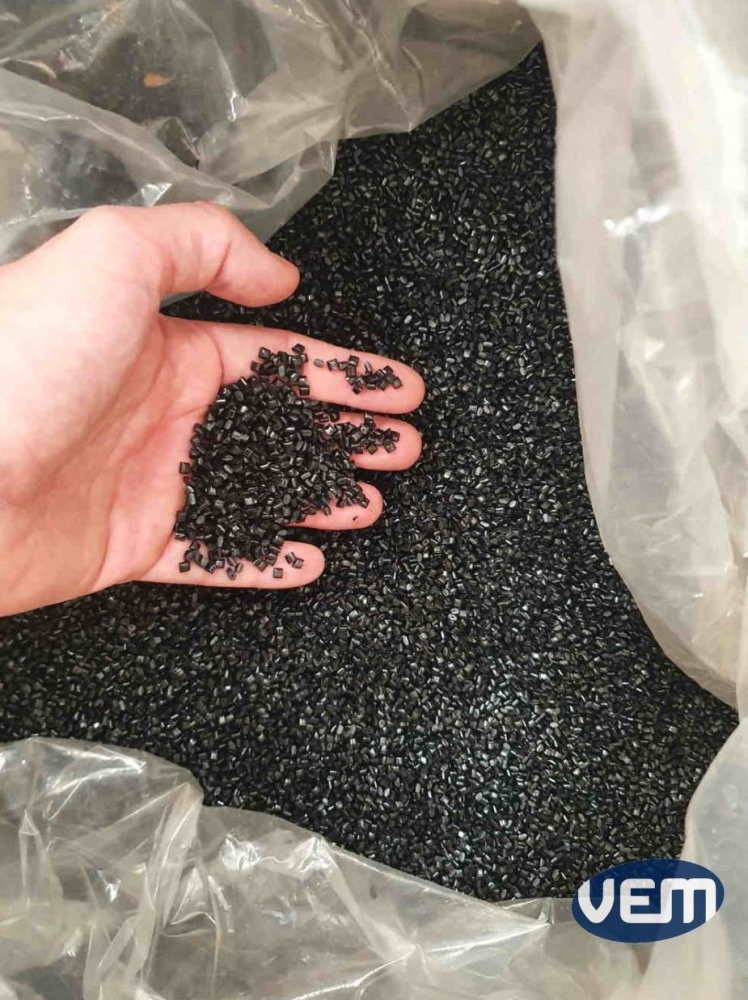
ABS Plastic cannot only resist impacts, but it is also resistant to chemicals. It does get easily attacked by polar solvents but apart from that, it is strong and durable.
ABS Plastic can be processed on almost every standard machinery. It can be injection-molded or blow-molded and since it has a low melting temperature (approximately 200°C or 392°F), it’s suitable for processing by 3D printing on an FDM machine. Thus, ABS plastic can be used in a wide array of applications.
Chemical Structure of ABS Plastic: (C₈H₈·C₄H₆·C₃H₃N)ₙ
ABS plastic is a low-cost thermoplastic polymer whose properties enable it to be applied to various product designs. Let’s take a look at some of its properties:
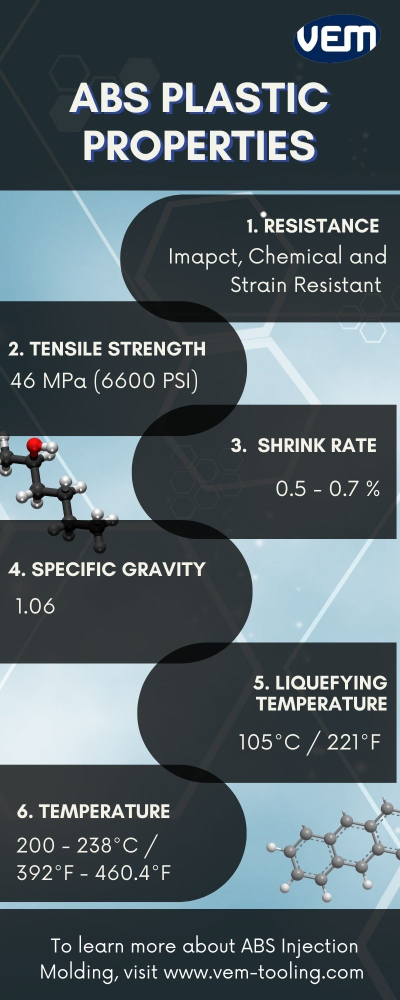
As noted above in the properties, ABS plastic material has excellent resistance to stress, chemicals, heat and impact. It also offers a great balance of dimensional stability, tensile strength, and electrical characteristics. All these characteristics make it a strong and durable plastic material.
Further, let’s understand how ABS plastic reacts to heat and its melting temperature: ABS plastic is a thermoplastic. As opposed to the thermoset plastic materials which allow only one-time heating during the injection molding process, thermoplastics do not burn. They do not undergo degradation through the process of heating to their melting point, cooling and reheating.
Thus, ABS plastic does not undergo degradation. They instead become liquid, so they can be easily injection molded. This property also allows it to be recycled. Thermoplastic liquefies when it reaches a certain temperature level. In the case of ABS plastic, this temperature is 105°C / 221°F. ABS plastic thus, remains rigid and tough even at low temperatures.
ABS plastic has various grades and is available in fire-retardant, heat-resistant and palatable grades. It is thus considered not only durable but also safe.
It’s established that ABS Plastic is a popular material choice for injection molding techniques but we must note that it has both advantages as well as disadvantages.
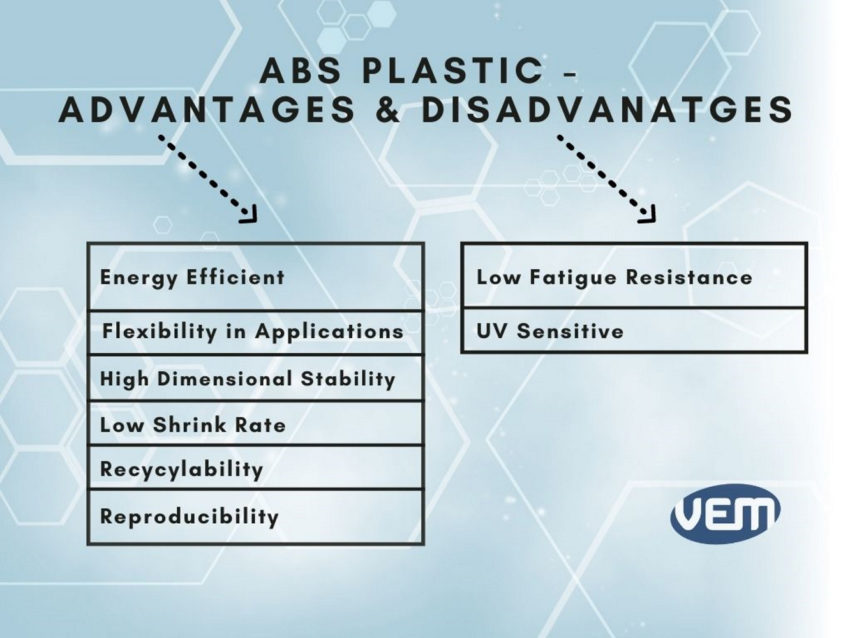
Let’s understand them in-depth:
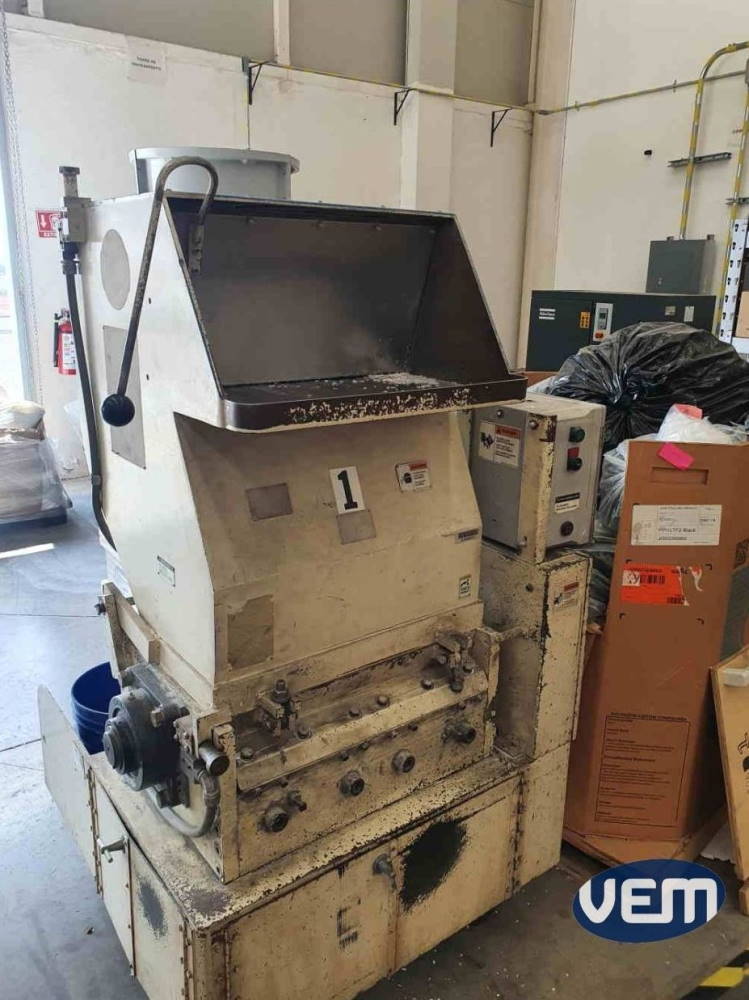
ABS plastic in its pellet form is melted into a moldable state which is then injected into the cavity of the mold where it forms a part. The molten plastic solidifies as soon as the mold is filled which then cools to take the shape of the mold. Once it has fully cooled, the mold sides open to eject the part. The mold parts are then reset to begin the process again.
If the thickness of the wall isn’t uniform, then the ABS plastic may be under stress which is why the wall of the plastic parts design must be uniformly thick. Your manufacturer can also implement extra ribs or radii to enhance the strength of the mold.
It’s essential to pay attention to the radius size as it is inversely proportional to the stress and strain on ABS plastic. The more the radius, the less the stress.
The wall thickness also determines the radius size, thus, it should be ensured by the manufacturer that the ratio of the radius to the wall thickness is not less than 0.3. You should also avoid using an excessively large radius as shrinkage of the resin can occur when the radius is too big.
It is imperative to ensure that ABS resins are dried before proceeding for processing and manufacturing. This is because dry ABS resins tend to absorb water which can result in various issues. They can lead to increased operating costs and cycles. You must also note that the presence of water often leads to cloudy molded parts.
Overheating ABS resins can lead to thermal decomposition which is why it is essential to ensure optimum injection molding temperature controls. If manufacturers apply excessive heat to the plastic, the chemical bonds will break which often results in brown granules on the injected molded part. This is generally unavoidable if your manufacturer uses old equipment with poor temperature control.
The molding temperature needs to be high when the injected molded ABS parts contain high gloss and ensure not to damage the material in the process. Thus, the temperature for ABS plastic is higher than other injection molding materials.
The recommended temperature range is between 200 – 238°C / 392°F – 460.4°F. You must also ensure that if the temperature is higher, the resins should not be exposed for a longer time. This will prevent degradation of the ABS resins.
In case of ABS plastic resins, high injection pressure is necessary due to its viscosity but your manufacturer needs to ensure that even though the injection pressure is high, it’s not excessively high as it can increase friction and cause sticking of the molded parts. These molded parts can be separated but separating the molded parts causes the production cost to increase. It is also essential to ensure that the injection pressure isn’t low as low pressure leads to an increase in mold shrinkage, which results in inferior quality parts.
The next factor that your manufacturer should ensure is the injection molding speed. If the injection molding speed is high, it can cause burning or thermal decomposition of the plastic material. It can also cause poor glossiness, discoloration and weld lines in the plastic material.
On the other hand, if the injection molding speed is too slow, insufficient mold filling will occur which can result in other types of defects in the injection molded part.
ABS plastic pre-treatment: ABS resins in dry form tend to absorb moisture. Thus, it is essential that they are dried prior to processing. It is recommended that ABS resins are treated between 80 to 90°C for at least 2 hours. This pretreatment restricts the moisture content of the resin to less than 0.1%. The moisture absorption rate of ABS plastic is between 0.2% – 0.8%.
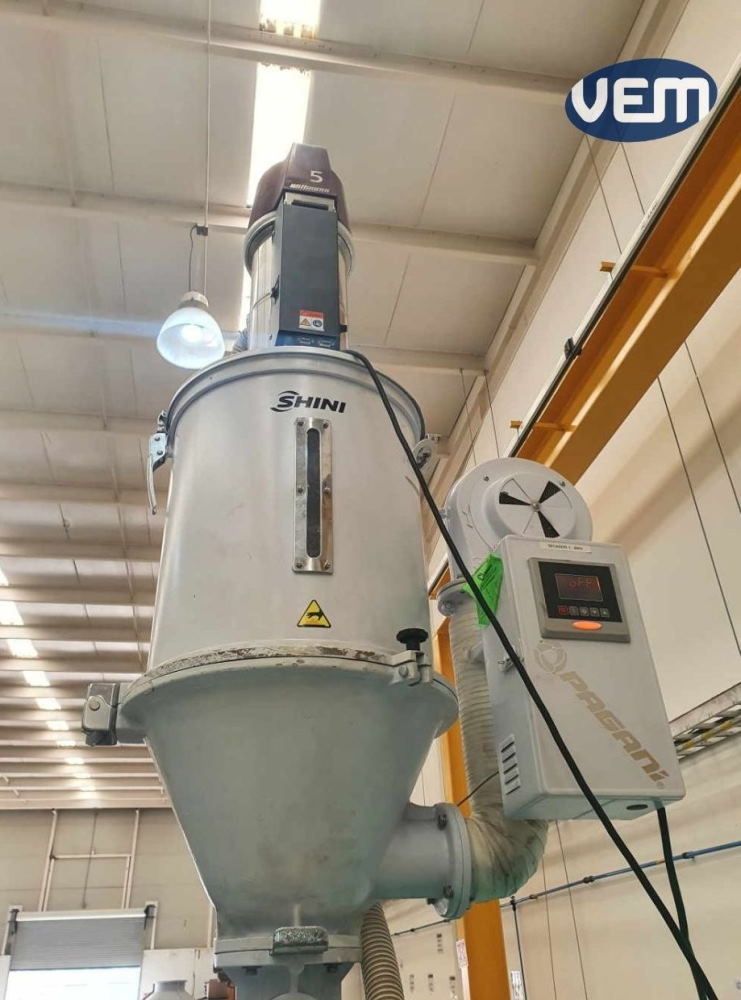
Melting Point: The melting point temperature is between 200 to 280°C.
Injection Molding Pressure: The plastic molding injection pressure is between 50 – 100 MPa
Gate & Vent Design: The gate and vent design needs to be optimally designed according to the plastic. In the case of ABS plastic, following parameters should be paid attention to:
Back Pressure: A high back pressure is able to ensure uniform mixing but to avoid wear, back pressure should be as minimum as possible. The expected back pressure is usually 5 bar.
As we have discussed above, ABS plastic is impact and chemical resistant which makes it ideal for a wide array of applications. It is also a popular choice in injection molding techniques because of its low melting point and low cost. It has been thus implemented in various industrial and commercial industries. Let’s take a look at some of the sectors ABS Plastic can be applied to:
*Pictures from Unsplash
ABS Plastic can be applied to a wide array of products but it is particularly used when the project details require rigidity and durability from a product while ensuring that it is lightweight as well. Some of its popular applications include home appliances, musical instruments, computer parts and more.
ABS Plastic is available in the form of resins, rods and sheets. We have listed some of the leading suppliers for ABS Plastic:
VEM Tooling has the expertise and the team that is required for your ABS plastic injection molding techniques. At VEM Tooling, we offer quick quotes, fast, and dependable service.
VEM Tooling team encompasses experts that can provide you with ABS injection molding guidance. We ensure that you have a great experience and a seamless manufacturing process from prototype to production. You can contact us to further understand how ABS Injection Molding can be implemented for your project and solve your manufacturing needs.
To better understand how VEM tooling can serve you, contact us or request a quote today.